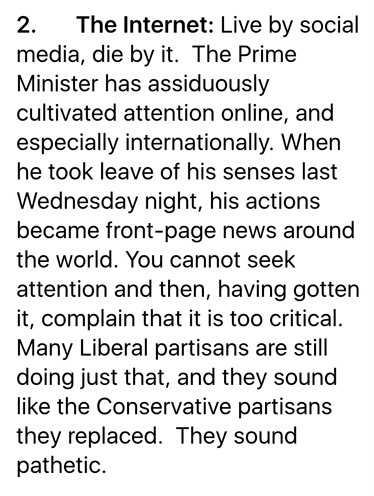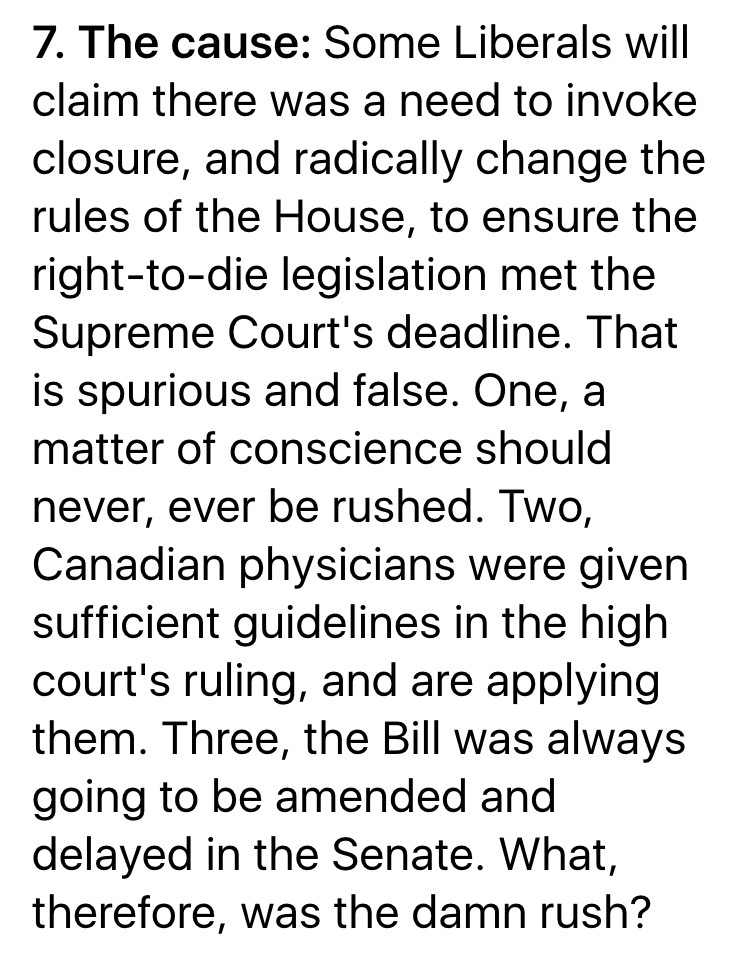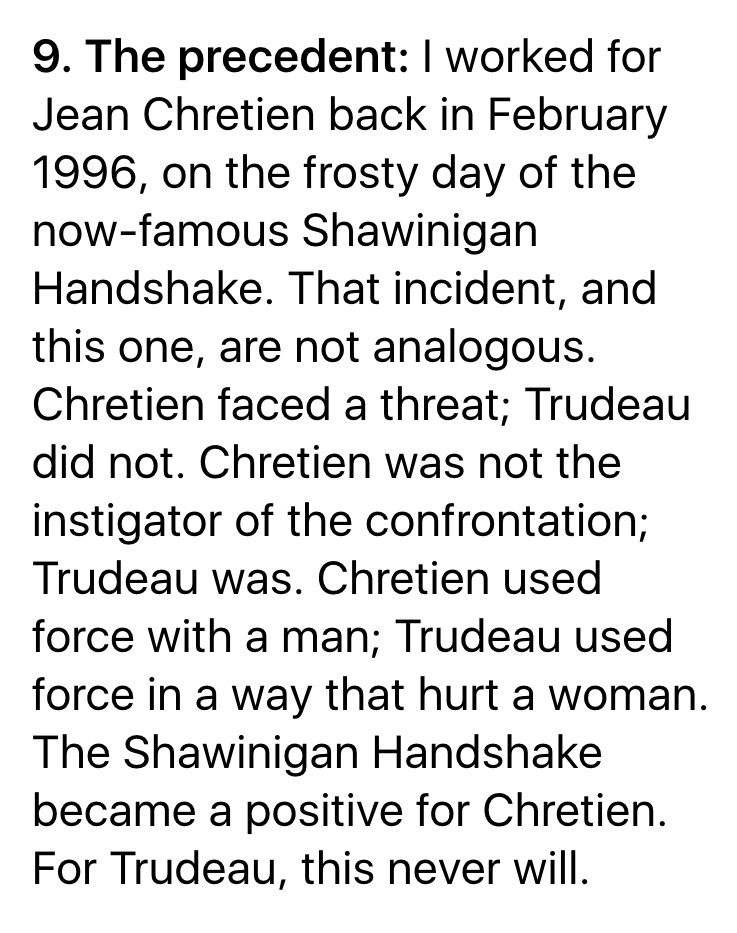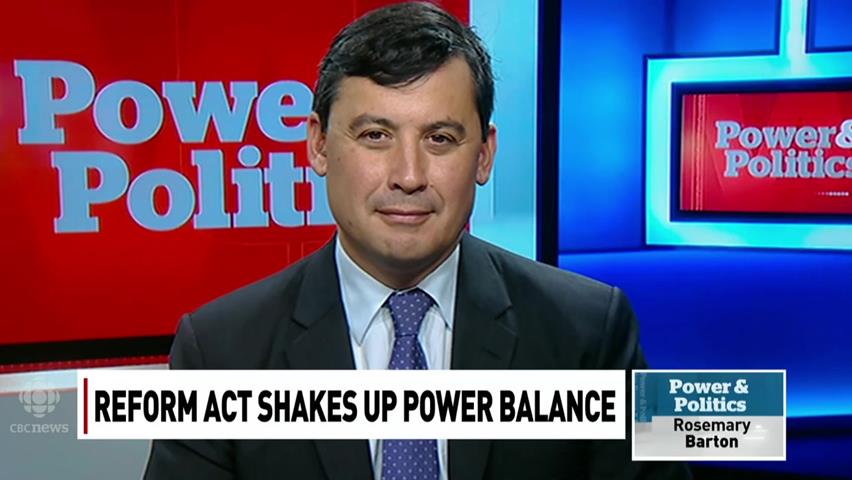In this week’s Hill Times: sorry, it was a stupid thing to do
On the night in question, I was at an event in Toronto honouring Senator Murray Sinclair. As it was getting underway, I received a text message from one of the Members of Parliament who had been at the very centre of it all.
“He should not have been out of his seat,” the text said. “That was a big error on his part.”
The “error” was an actual physical confrontation on the floor of the House of Commons, just like the ones they have in the Taiwanese Parliament. The “he” was the Prime Minister of Canada, Justin Trudeau.
Until former Justice Sinclair spoke, everyone in the room stared at their devices, periodically shaking their heads in wonder. Ten observations, from afar:
1. The law: When the Prime Minister intentionally grabbed and yanked the Conservative whip – much like Donald Trump’s campaign manager recently did to a reporter – it met the Criminal Code definition of assault. When he elbowed an NDP MP Ruth Ellen Brosseau, it didn’t. The elbow in Brosseau’s chest likely met the civil definition of assault, however. If she had later experienced bruising, things could have gotten quite complicated for the Liberal leader. Either way, if the physical stuff had happened off the Hill – in someone else’s workplace, for instance – charges, lawsuits and firings would have been the almost inevitable result.
2. The Internet: Live by social media, die by it. The Prime Minister has assiduously cultivated attention online, and especially internationally. When he took leave of his senses last Wednesday night, his actions became front-page news around the world. You cannot seek attention and then, having gotten it, complain that it is too critical. Many Liberal partisans are still doing just that, and they sound like the Conservative partisans they replaced. They sound pathetic.
3. The optics: The boxing photo ops are over. So, too, the earnest claims to being a feminist. The moment a man applies force in a way that it hurts a woman – inadvertent or not – it changes both, and the man can’t really claim to being much of a feminist anymore. If the country learned anything from the Ghomeshi trial, it is that.
4. The Liberals: This appalling episode has revealed the Liberal House Leader to possess a genial authoritarian streak. It has shown that the Liberal whip is in fully over his head, and wholly incapable of controlling his troops. It does not reflect well on the Speaker, either, because it is now apparent he does not oversee the Commons very well. And the Prime Minister? Well, what was once youthful and fresh now looks too-young and arrogant. In a matter of minutes, he did undid his good reputation with all but the most rabid Liberal partisan.
5. The NDP: As is their wont, they overplayed their hand, calling the elbow to Brosseau a deliberate criminal assault when any of the lawyers in their caucus could have told them it was not. Mulcair looked like the enraged father who was defending a daughter who had been manhandled, however, and it was an understandable response. Trudeau’s return to the scene of the alleged crime – to confront Mulcair, apparently, and toss around a few “F” bombs – wasn’t understandable at all. It was another huge lapse in judgment.
6. The Conservatives: If they’re smart, they will keep their cool, and stay above the (literal) fray. Referring the matter to committee was a shrewd move – it will ensure the controversy will be kept alive for weeks. Stephen Harper being in the House when it all happened? It’s a safe bet that he was smiling, somewhere, on Wednesday night.
7. The cause: Some Liberals will claim there was a need to invoke closure, and radically change the rules of the House, to ensure the right-to-die legislation met the Supreme Court’s deadline. That is spurious and false. One, a matter of conscience should never, ever be rushed. Two, Canadian physicians were given sufficient guidelines in the high court’s ruling, and are applying them. Three, the Bill was always going to be amended and delayed in the Senate. What, therefore, was the damn rush?
8. The footage: It is going to be replayed over and over. It is going to figure in the next election campaign. It is going to be as ubiquitous as the Zapruder footage. When you watch it, you cannot help but lose respect for any number of participants. It is bad.
9. The precedent: I worked for Jean Chretien back in February 1996, on the frosty day of the now-famous Shawinigan Handshake. That incident, and this one, are not analogous. Chretien faced a threat; Trudeau did not. Chretien was not the instigator of the confrontation; Trudeau was. Chretien used force with a man; Trudeau used force in a way that hurt a woman. The Shawinigan Handshake became a positive for Chretien. For Trudeau, this never will.
10. The contrast: Sitting there, listening to the extraordinarily thoughtful, kind, mature and reserved words of Senator Sinclair, I was struck by something else. I turned to my wife, a Liberal and a feminist, and said: “Senator Sinclair sounds like a Prime Minister. Tonight, the Prime Minister doesn’t look like a Prime Minister.”
Something changed rather dramatically, last Wednesday night. Per Buffalo Springfield, something happened, here. What it is ain’t exactly clear.
This much is true, however: for Justin Trudeau, none of it was good.







